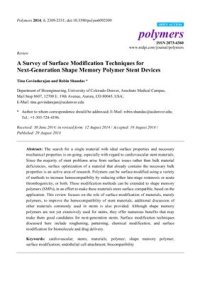
Ebook: A Survey of Surface Modification Techniques for Next-Generation Shape Memory Polymer Stent Devices
Author: Govindarajan T. Shandas R.
- Genre: Chemistry
- Tags: Химия и химическая промышленность, Высокомолекулярные соединения
- Language: English
- pdf
Article. — Polymers. — 2014. — №6. — P. 2309-2331. — DOI: 10.3390/polym6092309.The search for a single material with ideal surface properties and necessary mechanical properties is on-going, especially with regard to cardiovascular stent materials. Since the majority of stent problems arise from surface issues rather than bulk material deficiencies, surface optimization of a material that already contains the necessary bulk properties is an active area of research. Polymers can be surface-modified using a variety of methods to increase hemocompatibilty by reducing either late-stage restenosis or acute thrombogenicity, or both. These modification methods can be extended to shape memory polymers (SMPs), in an effort to make these materials more surface compatible, based on the application. This review focuses on the role of surface modification of materials, mainly polymers, to improve the hemocompatibility of stent materials; additional discussion of other materials commonly used in stents is also provided. Although shape memory polymers are not yet extensively used for stents, they offer numerous benefits that may make them good candidates for next-generation stents. Surface modification techniques discussed here include roughening, patterning, chemical modification, and surface modification for biomolecule and drug delivery.
Download the book A Survey of Surface Modification Techniques for Next-Generation Shape Memory Polymer Stent Devices for free or read online
Continue reading on any device:

Last viewed books
Related books
{related-news}
Comments (0)